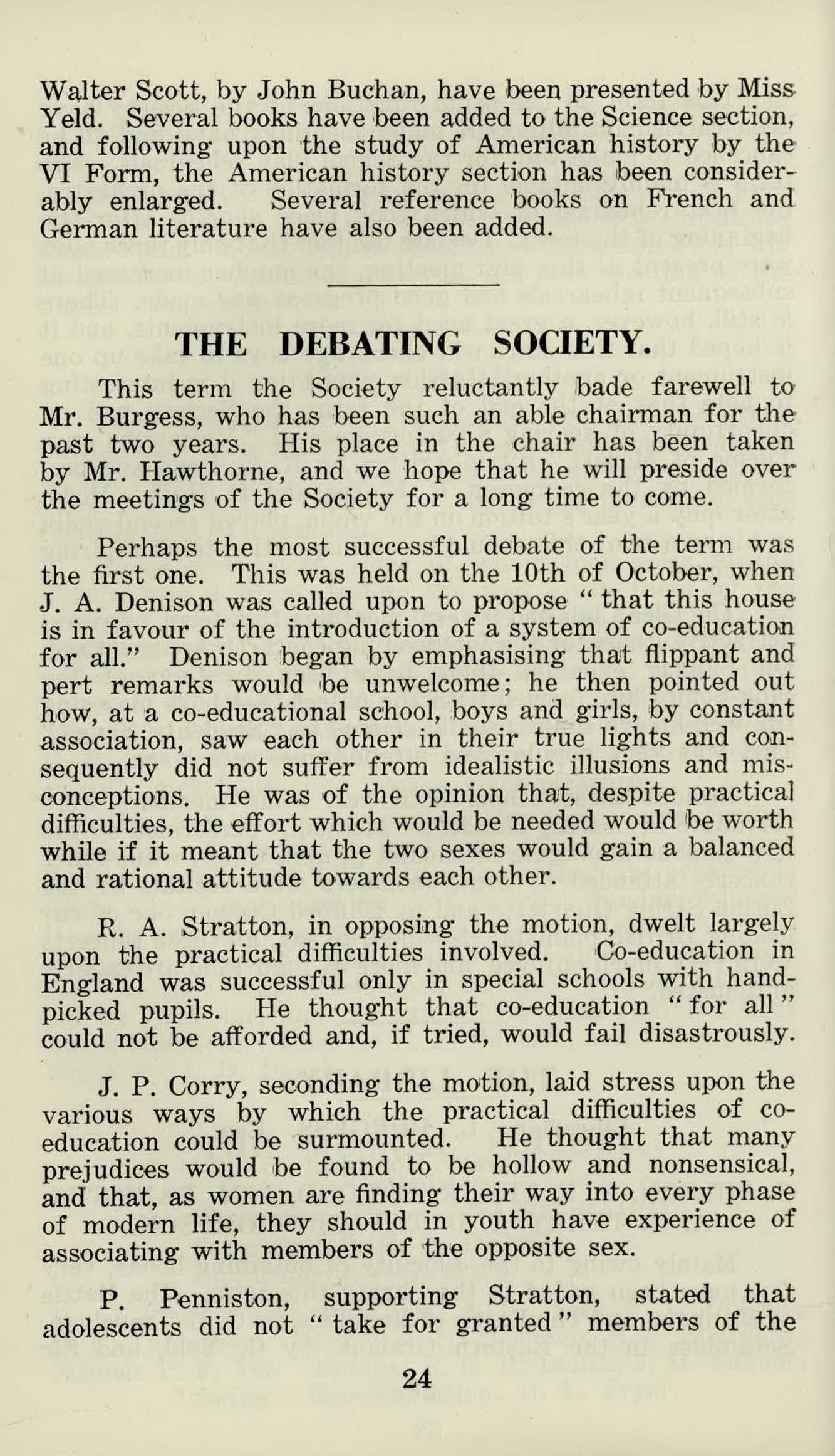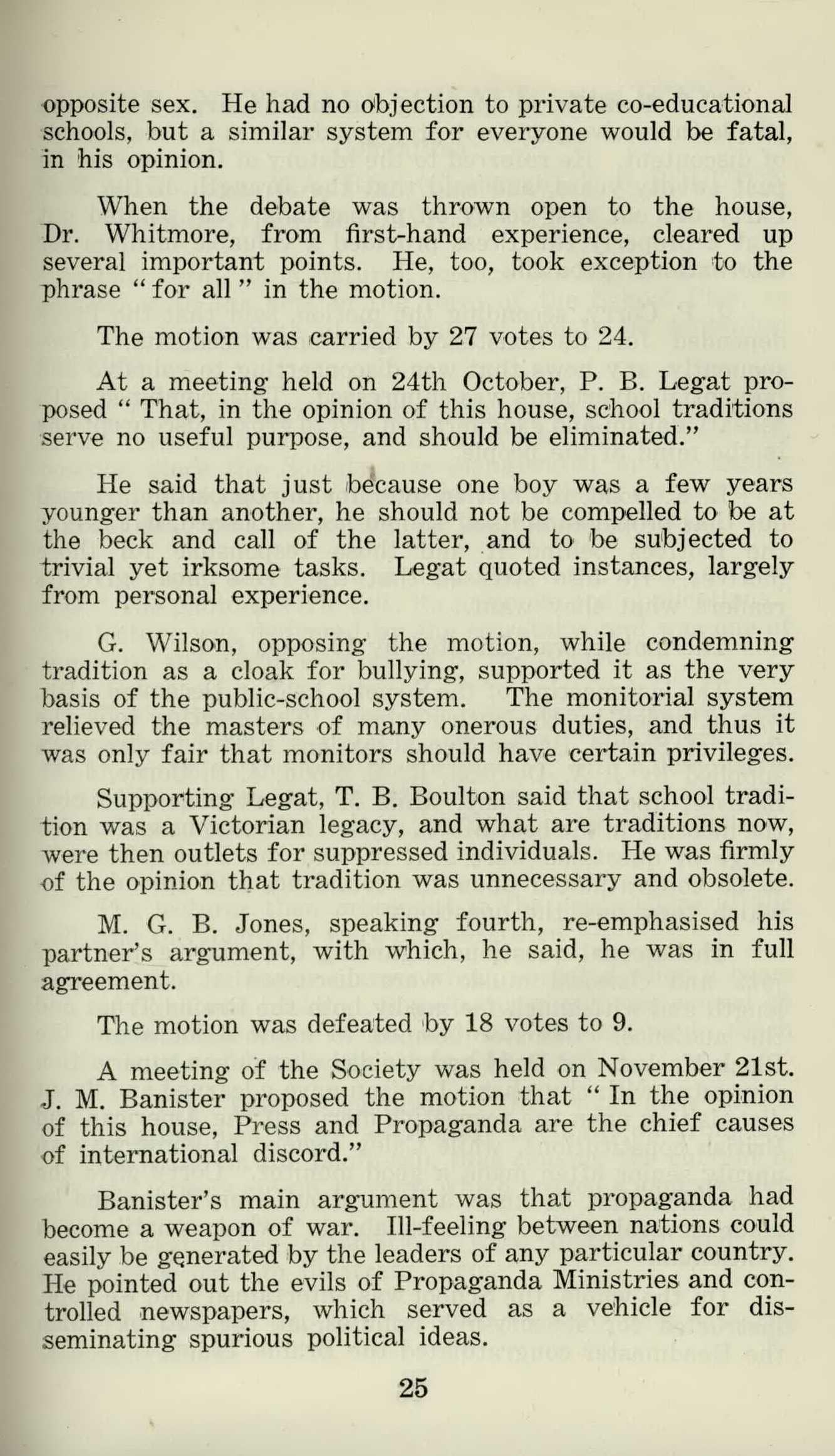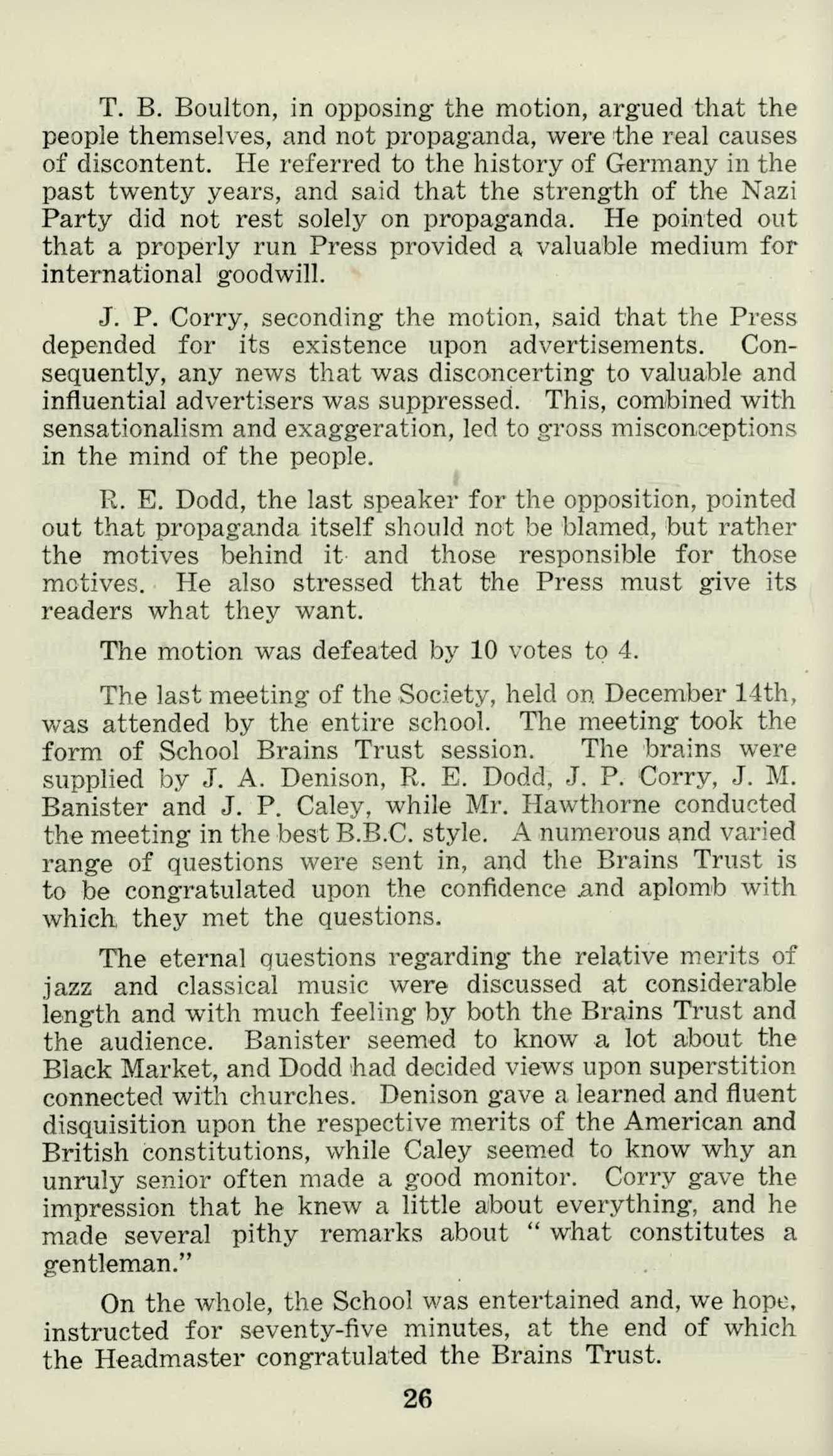
5 minute read
THE DEBATING SOCIETY
from Jan 1943
by StPetersYork
Walter Scott, by John Buchan, have been presented by Miss Yeld. Several books have been added to the Science section, and following upon the study of American history by the VI Form, the American history section has been considerably enlarged. Several reference books on French and German literature have also been added.
This term the Society reluctantly bade farewell to Mr. Burgess, who has been such an able chairman for the past two years. His place in the chair has been taken by Mr. Hawthorne, and we hope that he will preside over the meetings of the Society for a long time to come.
Perhaps the most successful debate of the term was the first one. This was held on the 10th of October, when J. A. Denison was called upon to propose " that this house is in favour of the introduction of a system of co-education for all." Denison began by emphasising that flippant and pert remarks would be unwelcome ; he then pointed out how, at a co-educational school, boys and girls, by constant association, saw each other in their true lights and consequently did not suffer from idealistic illusions and misconceptions. He was of the opinion that, despite practical difficulties, the effort which would be needed would be worth while if it meant that the two sexes would gain a balanced and rational attitude towards each other.
R. A. Stratton, in opposing the motion, dwelt largely upon the practical difficulties involved. Co-education in England was successful only in special schools with handpicked pupils. He thought that co-education " for all " could not be afforded and, if tried, would fail disastrously.
J. P. Corry, seconding the motion, laid stress upon the various ways by which the practical difficulties of coeducation could be surmounted. He thought that many prejudices would be found to be hollow and nonsensical, and that, as women are finding their way into every phase of modern life, they should in youth have experience of associating with members of the opposite sex.
P. Penniston, supporting Stratton, stated that adolescents did not " take for granted " members of the
opposite sex. He had no objection to private co-educational schools, but a similar system for everyone would be fatal, in his opinion.
When the debate was thrown open to the house, Dr. Whitmore, from first-hand experience, cleared up several important points. He, too, took exception to the phrase " for all " in the motion.
The motion was carried by 27 votes to 24.
At a meeting held on 24th October, P. B. Legat proposed " That, in the opinion of this house, school traditions serve no useful purpose, and should be eliminated."
He said that just bkause one boy was a few years younger than another, he should not be compelled to be at the beck and call of the latter, and to be subjected to trivial yet irksome tasks. Legat quoted instances, largely from personal experience.
G. Wilson, opposing the motion, while condemning tradition as a cloak for bullying, supported it as the very basis of the public-school system. The monitorial system relieved the masters of many onerous duties, and thus it was only fair that monitors should have certain privileges.
Supporting Legat, T. B. Boulton said that school tradition was a Victorian legacy, and what are traditions now, were then outlets for suppressed individuals. He was firmly of the opinion that tradition was unnecessary and obsolete.
M. G. B. Jones, speaking fourth, re-emphasised his partner's argument, with which, he said, he was in full agreement.
The motion was defeated by 18 votes to 9.
A meeting of the Society was held on November 21st. J. M. Banister proposed the motion that " In the opinion of this house, Press and Propaganda are the chief causes of international discord."
Banister's main argument was that propaganda had become a weapon of war. Ill-feeling between nations could easily be generated by the leaders of any particular country. He pointed out the evils of Propaganda Ministries and controlled newspapers, which served as a vehicle for disseminating spurious political ideas. 25

T. B. Boulton, in opposing the motion, argued that the people themselves, and not propaganda, were the real causes of discontent. He referred to the history of Germany in the past twenty years, and said that the strength of the Nazi Party did not rest solely on propaganda. He pointed out that a properly run Press provided a valuable medium for international goodwill.
J. P. Corry, seconding the motion, said that the Press depended for its existence upon advertisements. Consequently, any news that was disconcerting to valuable and influential advertisers was suppressed. This, combined with sensationalism and exaggeration, led to gross misconceptions in the mind of the people.
R. E. Dodd, the last speaker for the opposition, pointed out that propaganda itself should not be blamed, but rather the motives behind it and those responsible for those motives. He also stressed that the Press must give its readers what they want.
The motion was defeated by 10 votes to 4.
The last meeting of the Society, held on December 14th, was attended by the entire school. The meeting took the form of School Brains Trust session. The brains were supplied by J. A. Denison, R. E. Dodd, J. P. Corry, J. M. Banister and J. P. Caley, while Mr. Hawthorne conducted the meeting in the best B.B.C. style. A numerous and varied range of questions were sent in, and the Brains Trust is to be congratulated upon the confidence and aplomb with which they met the questions.
The eternal questions regarding the relative merits of jazz and classical music were discussed at considerable length and with much feeling by both the Brains Trust and the audience. Banister seemed to know a lot about the Black Market, and Dodd had decided views upon superstition connected with churches. Denison gave a learned and fluent disquisition upon the respective merits of the American and British constitutions, while Caley seemed to know why an unruly senior often made a good monitor. Corry gave the impression that he knew a little about everything, and he made several pithy remarks about " what constitutes a gentleman."
On the whole, the School was entertained and, we hope, instructed for seventy-five minutes, at the end of which the Headmaster congratulated the Brains Trust.
26











